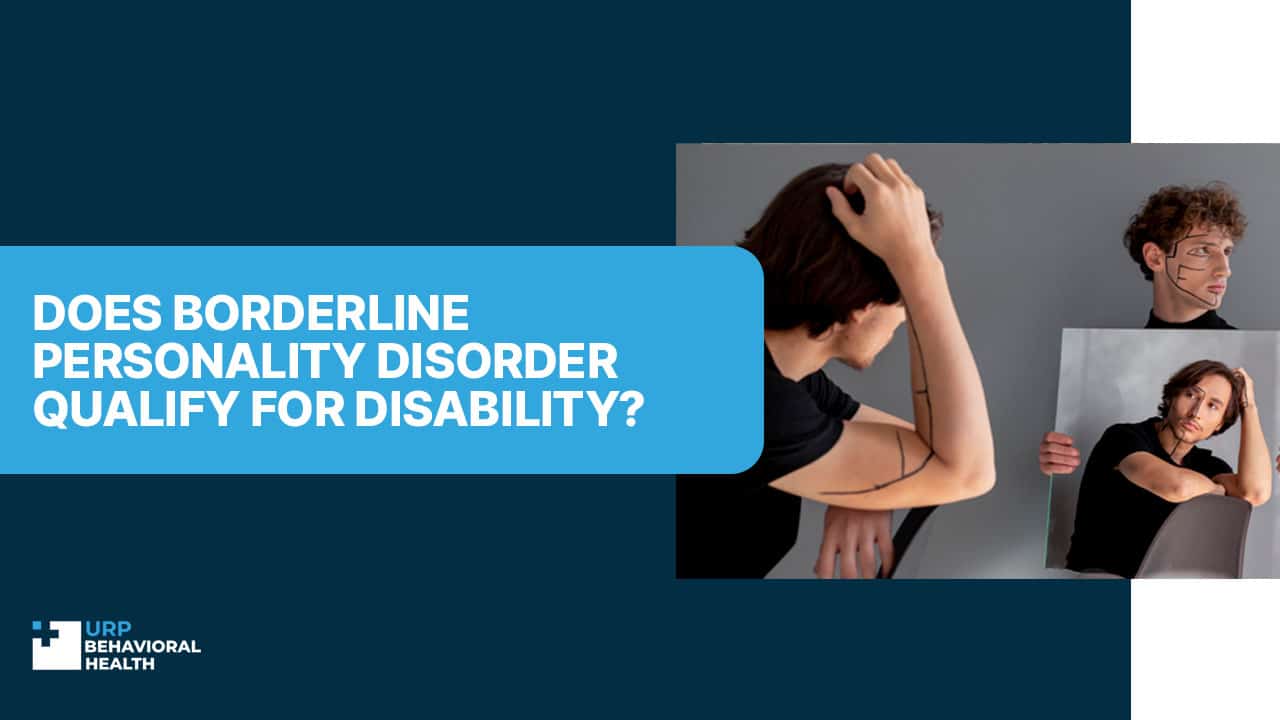
Does Borderline Personality Disorder Qualify for Disability?
A borderline personality disorder is a rather complex psychological disorder that can influence a multitude of spheres in the life of the affected individual. Indeed, for many of the patients, it leaves the question to consider whether one can claim that BPD is a kind of disability, particularly, if one has to experience very severe symptoms that substantially affect his or her functioning [1].
About Borderline Personality Disorder
Borderline personality disorder can be explained by the set of psychological features that significantly affect the lives of the patients. The symptoms of insomnia include the following among others:
- Mood instability. That refers to abrupt fluctuations in one’s mood that may at one moment be elated before flipping to being depressed.
- Identified an inclination to engage in reckless behaviors and make reckless decisions or have self-destructive behavior.
- Self-image disorder. Sustaining a stable concept of self, or ego, and being overwhelmed by the signs encourages the acquisition of more cultural capital.
- Fear of abandonment. Panic in situations when one can be left alone by those dear, despair, and often Preposterous action.
- Interpersonal problems. The failures to form and maintain healthy working and interpersonal relationships and therefore conflict.
These symptoms can cause problems at work and can affect Interpersonal relationships, which in turn minimizes the quality of life [7].
Is BPD a Disability?
Disability is described as a person’s physical or mental ailment that has been given a chance of forcing the individual to avoid important life tasks. BPD may be regarded as a disability where the symptoms are Nobel to the extent that a person cannot live a near-normal life [2].
Contact our admissions team now to begin your path toward a brighter future.
Does BPD Qualify for Disability Under SSA Rules?
It is the duty of the Social Security Administration (SSA) to decide if a particular state of a person’s health falls under the definition of disabled according to the SSA. Although BPD is not included in the SSA’s “Listing of Impairments,” persons with BPD can be entitled to the benefits if symptoms that are characteristic of their condition correspond to the criteria of other listed illnesses, such as major depression, anxiety disorders, or bipolar disorder:
- Severity of symptoms. The–symptoms of BPD have to be severe and chronic and thereby cause notable difficulties in carrying out basic work-related functions.
- Documented medical evidence. An elaborate symptom history should be taken so that the level of severity, number of hours per day, and number of days per week this problem has been observed is recorded. This is whereby further details are often produced by psychiatrists, psychologists, and other professionals in mental health.
- Functional limitations. The individual must demonstrate that their BPD symptoms cause marked limitations in at least two of the following areas: social functioning, concentration, persistence, pace, and episodes of decompensation.
- Duration of impairment. The SSA also has certain necessary criteria, and one of them is that the condition for which the person is applying for benefits has to be expected to last, or has lasted, for at least 12 consecutive months [1].
Is BPD a Disability under the ADA?
The Americans with Disability Act, signed into law in July 1990, also states that it is unlawful to discriminate against anyone with a disability including those who have a mental health disorder such as BPD. According to the ADA, BPD can be regarded as being disabled if the illness impairs one or more significant functions of the person including, employment, social or household activities:
- Reasonable accommodations. Some employees with BPD might seek special consideration or even the flexibility to do their jobs differently, for instance, by changing their hours, being allowed to work remotely, or having their workload adjusted.
- Protection from discrimination. BPD is covered under the ADA, which means that individuals who suffer from the disorder cannot be discriminated against in terms of employment including hiring and promotion. Employers are obliged to do so unless it would impose “undue hardship” on the party requested to make the change.
- An employer needs to ensure that any information regarding the employee’s health or a diagnosis of BPD, in particular, must not be placed in the employee’s personnel file at all, but if it is communicated, then such information must be kept in a separate, separate file and locked.
- Interactive process. Both the employers and the employees are supposed to participate in an “interactional process” to come up with a reasonable accommodation [8].
- Take the First Step With Free Insurance Verification
We’ll help you understand your options and guide you toward care.
Is Borderline Personality Disorder Considered a Disability for SSDI or SSI Purposes?
SSDI and SSI are both federal programs that offer support to those with disabilities, including BPD. For a person to be eligible for SSDI or SSI they have to pass through stringent medical and financial tests:
- Work credits (SSDI). SSDI applicants are also required to establish they have enough work credits from previous years of employment. The credits required to qualify vary with the applicant’s age at the point of BPD disability inception.
- Financial need (SSI). SSI is a need-based program, and therefore it pays disability benefits to those persons who have low income or limited resources and no work record. BPD has to be of such a degree that the affected person cannot perform any SGA, that is engage in any kind of work for pay or profit, calamity or otherwise, even at the SGA level.
- Medical documentation. Specific and contemporaneous medical records including physician’s note, psychotherapist’s note, mental health treatment records, and all medical reports with regard to hospitalization or rendering of therapy or any other psychiatric or psychological treatment are required for the support of the claim.
- Residual Functional Capacity (RFC). The SSA will evaluate the individual, and his or her residual functional capacity, or RFC, which defines a person’s capacity to meet the physical and mental demands of the workplace despite his or her impairment. One may be entitled to BPD disability benefits if it causes a considerable reduction in the individual’s RFC.
- Application process. Getting approval for SSDI or SSI may take time and sometimes is very involved. It is generally a process that requires several steps, which are the application, reconsideration step, and hearing the appeal if a claim is rejected [6].
Can You Get Disability for BPD?
It is possible, but the process of getting a disability recognition because of BPD is long and always based on evidence provided that demonstrates how the symptoms interfere with one’s daily functioning:
- Working with a specialist lawyer. It may prove wise, if one is involved in a disability claim, to seek the services of a lawyer who has specialized in BPD and disability cases.
- Thorough documentation. The medical evidence supports clients and must be as detailed as possible in the nature and duration of complaints.
- Ongoing support. Claims can be fortified by constant visits by doctors and therapists in the process [5].
Who Decides If Borderline Personality Disorder Is a Disability?
Determining whether BPD is going to be treated as a disability is within the jurisdiction of the BPD authorities: the SSA or the ADA. These institutions study the medical documents submitted and assess whether the signs of the ailment qualify the person with a disability:
- Physicians and psychologists. It has a critical part in documenting the medical need with suitable papers where necessary.
- Social security authorities. These assess the proofs presented in the claim and conclude the claim.
- They can help the person concerned with the application and if necessary an appeal [3].
Conclusion
BPD disability has requirements in certain cases. For people affected to be fully recognized, they have to be cautious and get full medical documentation and counseling. Those affected should take steps to secure proper medical records and seek professional advice in order to be fully acknowledged for their condition. URP Behavioral Health provides as much assistance and recommendations for the people in crisis, as to help them get the ideal support as soon as possible [4].
Reach out today and let us create a treatment plan designed around your needs.
References:
- Atticus. “Borderline Personality Disorder (BPD) Disability Benefits.” Available at: https://www.atticus.com/advice/conditions-that-qualify-for-disability/borderline-personality-disorder-bpd-disability-benefits
- Cbassociatetraining.co.uk. “Is Borderline Personality Disorder a Disability?” Available at: https://cbassociatetraining.co.uk/is-borderline-personality-disorder-a-disability/
- Gillette Law Group. “Borderline Personality Disorder & Social Security Disability Benefits.” Available at: https://gillettelawgroup.com/borderline-personality-disorder-social-security-disability-benefits/
- ILO. “Mental Health and Work: Impact, Issues and Good Practices.” Available at: https://www.ilo.org/sites/default/files/wcmsp5/groups/public/@ed_dialogue/@lab_admin/documents/publication/wcms_795460.pdf
- Jeffrey Freedman Attorneys. “Borderline Personality Disorder and Social Security Disability.” Available at: https://www.jeffreyfreedman.com/borderline-personality-disorder-and-social-security-disability/
- Keefe Disability Law. “Disability Listing for Borderline Personality Disorder.” Available at: https://www.keefelaw.com/blog/disability-listing-for-borderline-personality-disorder.cfm
- Mayo Clinic. “Borderline Personality Disorder: Symptoms and Causes.” Available at: https://www.mayoclinic.org/diseases-conditions/borderline-personality-disorder/symptoms-causes/syc-20370237
- Peachtree Wellness MH. “Is Borderline Personality Disorder a Disability?” Available at: https://peachtreewellnessmh.com/is-borderline-personality-disorder-a-disability/
















